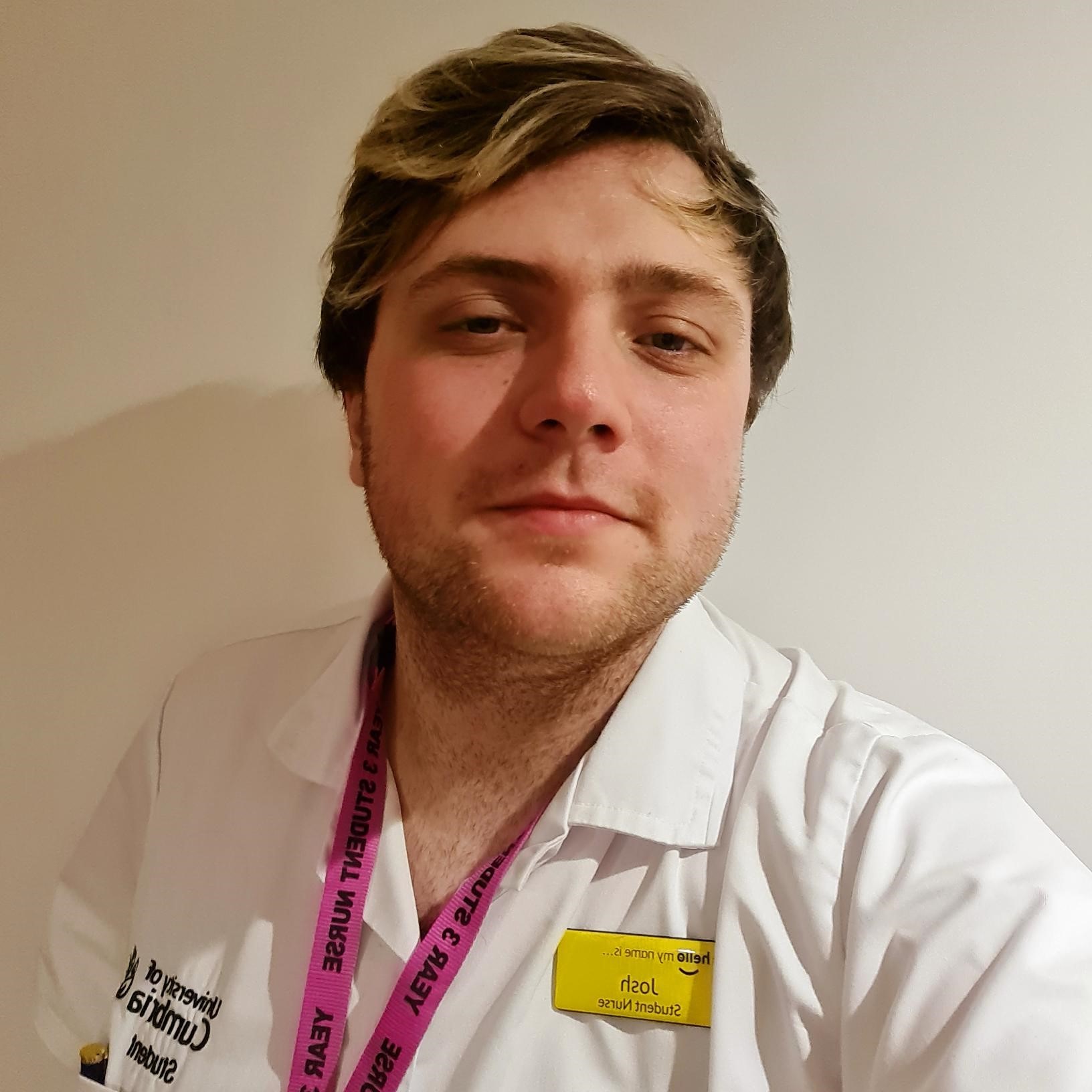

Josh was inspired to go into nursing to make a difference. After seeing the mixed quality of care his grandfather received Josh wanted to become a nurse to deliver quality care to others.
Why did you want to come to university?
I decided to come into nursing for two reasons really, the first was to do with my grandfather, a fantastic man. My grandfather was, unfortunately, the victim of the MRSA epidemic in the early 2000s whilst also contracting E.coli, Sepsis and C. difficile while in hospital from community acquired gangrene. Alongside, other comorbidities such as type 2 diabetes and COPD his wound healing was delayed and became infected leading to the need to amputate.
He was then given penicillin and he had a known allergy to it. Needless to say, there was a period when we did not think he would make it. As a family we were, unfortunately, let down by the very system which was created to help us. However, the local primary care group were exceptional and ensured he was cared for and received outstanding practice right through to the end of his life many years later.
Secondly, at the time of his passing, I was halfway through completing my Bachelor's degree in Conservation Biology and although I had an interest in wider Biology, I realised I was more interested in applied human biology and that I could be that person to make that difference as cliché as it sounds in that patient encounter. So, I decided to re-qualify and become a nurse to deliver quality care.
I am now in my 3rd year, due to qualify in September 2022 and I am genuinely humbled and will always be that constructively disruptive nurse who ensures those at their most vulnerable receive the I would have expected for my grandfather.
Why did you choose Cumbria?
I chose the University of Cumbria because although there are Universities closer to home in the North East, I wanted to broaden my horizons and experience the complexities of rural medicine in the Lake District. Because of the large geographic area and the smaller cohort sizes we have, student nurses are able to have experiences in practice which are very specialist and I would not have had exposure to in a big inner-city hospital.
What has been the most difficult thing you’ve overcome in your education journey and how did you overcome this?
We were the cohort who just started nursing on September 19 before the start of the outbreak in December 2019. Learning and adapting has been the most difficult aspect of being an undergraduate nurse during that time. I personally overcame this by becoming an elected representative in the Royal College of Nursing with the help of my fellow colleagues to give a true voice for Cumbria in the North West. There is no doubt that being a student nurse is difficult, sacrificing your time, juggling a part-time job, home life, academic pressures and clinical practice. However, you need to remember why you are training and see the end goal. We are future nurses and we will make a difference because we have the academic and practical know-how to not accept second best.
How did the university help you through your studies?
The university supplied us with core skills and knowledge to apply the evidence base to my practice. For example, because of chest auscultation theory and simulation on sophisticated patient mannequins, I was able to identify the chest sounds associated with pulmonary effusion (consolidation) which contributed to the diagnosis of pulmonary embolism all because I was able to listen to a chest and understand what different noises may indicate. This is a skill that not many nurses know unless they are specifically trained in auscultation.
I do feel supported always and I know my tutor and lecturers will always help whenever we need it.
What are your top tips for anyone else thinking of going to university?
- Be organised and make sure you get yourself either a little diary or an e-diary to keep tabs on all of your hours, assignments, training schedules and all the other little tasks which you do not want to be stressing about last minute.
-
Read textbooks because knowledge is power and if you know what you are talking about and you have the evidence to back it up, you will be a powerful patient advocate to be reckoned with. If you get one book as a student nurse, get yourself a copy of the student edition of the Royal Marsden Manual and swot up on all your core skills.
How has studying at the University of Cumbria changed you?
I have loved my time at Cumbria and the personalised education I have received where the lecturers know who you are and you are not a student number in a crowded lecturer theatre. You never know, I might be back for some post-graduate study!
What is your favourite part of the course?
Although this will be contrary to many of my colleagues, I really enjoy academia and learning new things by doing essays and understanding statistics. So my favourite part of the course has been the Public Health module and specifically the assignment where I was able to analyse the public health of a specific geographic area.
Have you got a job lined up for the end of your course?
I have got my first newly registered job, I am heading back to my hometown to contribute to improving nursing there as a Community Staff Nurse. I will also be ruffling feathers with my continued work with the Royal College of Nursing.
